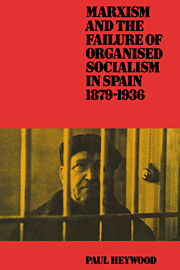Book contents
- Frontmatter
- Contents
- Preface
- Abbreviations used in text
- 1 Decaffeinated Marxists: the PSOE, 1879–1914
- 2 Reform, revolution and the roots of rupture: the PSOE, 1914–1919
- 3 Socialist schism and the development of organised Communism, 1919–1923
- 4 Dealing with a Dictator: organised Socialism, 1923–1931
- 5 Marxist mistakes: misinterpreting the Second Republic, 1931–1934
- 6 Marxism marginalised: the PSOE and the creation of the Popular Front, 1934–1936
- Conclusion
- Notes
- Bibliography
- Index
4 - Dealing with a Dictator: organised Socialism, 1923–1931
Published online by Cambridge University Press: 08 September 2009
- Frontmatter
- Contents
- Preface
- Abbreviations used in text
- 1 Decaffeinated Marxists: the PSOE, 1879–1914
- 2 Reform, revolution and the roots of rupture: the PSOE, 1914–1919
- 3 Socialist schism and the development of organised Communism, 1919–1923
- 4 Dealing with a Dictator: organised Socialism, 1923–1931
- 5 Marxist mistakes: misinterpreting the Second Republic, 1931–1934
- 6 Marxism marginalised: the PSOE and the creation of the Popular Front, 1934–1936
- Conclusion
- Notes
- Bibliography
- Index
Summary
On 13 September 1923, General Miguel Primo de Rivera assumed political power in Spain through a coup d'état organised with the connivance of King Alfonso XIII. His regime survived just six years, the popular enthusiasm with which he was initially received having long since dissipated when finally he was obliged to resign, a broken man, in January 1930. The precise nature of his regime remains a matter of some controversy. However, it is undeniable that Primo was given assistance of inestimable value by the willing co-operation of the Socialist movement, after only the briefest initial hesitancy, in his plans for the re-organisation of labour relations along fashionably corporativist lines. The Socialists abandoned all opposition to Primo by 22 September 1923 with the publication of a note by the PSOE Executive Committee calling on all Socialists and their sympathisers to refrain from extra-legal action which might provoke a violent response from the Dictatorship. By their participation in undemocratic state structures, the Spanish Socialists allowed the new regime scope to retain some degree of popular legitimacy despite its ban on party political activity, rigorous repression of the Anarchosyndicalist CNT and the Communist PCE, establishment of a military Directory and a single party, and the imposition of press censorship. However, it is an ironic paradox of Spanish Socialism that collaboration with the Dictatorship of Primo de Rivera can be seen not only as the most undistinguished episode of its history, but also as a period vital to the PSOE's ability to play the central role in the establishment of the Second Republic.
- Type
- Chapter
- Information
- Publisher: Cambridge University PressPrint publication year: 1990



